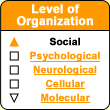|
|
|
|
 |
Fear,
anxiety and anguish |
 |
|
|
|


| When people live in a culture
of fear, they adopt attitudes and behaviours that minimize
their risk of being persecuted. They become docile,
submissive, and silent. When they see friends, neighbours,
and family members suffer the physical and psychological cruelties
of repression, they become afraid of the mere idea of questioning
the often racist, sexist, and inegalitarian status quo in
which they live. |
|
|
Fear is the body's natural alarm system,
and sometimes it can
save our lives. But like any useful mechanism, it can also do
us harm if it gets out of control.
In particular,
when fear becomes chronic because it is reinforced daily,
it can make us too
terrified to act or even to think.
This is why repressive measures
are instituted by authoritarian governments: to break
any will to oppose them. If anyone dares to think differently,
the government persecutes them relentlessly. To stay
in power, such governments instil in their people what
is known as a "culture of fear". |
|

|
 |
|
A culture of fear can be established directly
through violence by the police or the army, as happens in
military dictatorships. It can also be created by terrorism
and the whole panoply of methods that terrorists use to establish
a climate of fear, such as targeted assassinations, bombs
in public places, and so on.
The culture of fear is also present in contemporary societies
that like to consider themselves democratic. But in such
societies, the methods that maintain this culture are different
and more subtle, usually involving the mass
media. |
|
|






